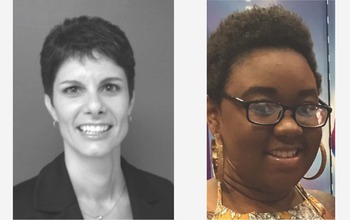New Earth Sciences Staff Springs into Action, 2019

Ingrid Padilla (program director), Donnisha Peacock (program specialist intern)
April 1, 2019
The Division of Earth Sciences (EAR) welcomes a new program director and program specialist intern. Ingrid Padilla, program director for Hydrologic sciences, joins us from the University of Puerto Rico, Mayagüez. Her expertise is in contaminant and groundwater hydrology, although her research extends over a wide range of systems and scales. Ingrid received her Ph.D. in hydrology from University of Arizona, M.S. in water resources science from University of Michigan and B.S. in natural resources science and management from University of Maryland, College Park.
Donnisha Peacock joins Earth Sciences after serving nearly 5 years in the U.S Navy as a logistics supply specialist. She worked on a shore command, supporting the submarine community. Donnisha was also stationed in Japan working on an aircraft carrier. She is pursuing her bachelor’s degree in business.
The division is grateful for the service of program directors, David Fountain and Venkat Lakshmi, who left NSF for retirement and to continue research at Virginia Tech, respectively. The division also appreciates the dedicated service of Yasmin Adwali, who retired with 30 years as a program specialist in EAR, and Nadine Mckenzie, who retired after serving NSF in a variety of roles.
If you would like timely news from the Division of Earth Sciences (EAR), subscribe to EAR Express Updates newsletter by sending a blank email to earth-subscribe-request@listserv.nsf.gov. You can unsubscribe at any time by emailing earth-unsubscribe-request@listserv.nsf.gov. Send updates and highlights about your NSF-funded research and education projects to EAR Communication.
The U.S. National Science Foundation propels the nation forward by advancing fundamental research in all fields of science and engineering. NSF supports research and people by providing facilities, instruments and funding to support their ingenuity and sustain the U.S. as a global leader in research and innovation. With a fiscal year 2023 budget of $9.5 billion, NSF funds reach all 50 states through grants to nearly 2,000 colleges, universities and institutions. Each year, NSF receives more than 40,000 competitive proposals and makes about 11,000 new awards. Those awards include support for cooperative research with industry, Arctic and Antarctic research and operations, and U.S. participation in international scientific efforts.
Connect with us online
NSF website: nsf.gov
NSF News: nsf.gov/news
For News Media: nsf.gov/news/newsroom
Statistics: nsf.gov/statistics/
Awards database: nsf.gov/awardsearch/
Follow us on social
Twitter: twitter.com/NSF
Facebook: facebook.com/US.NSF
Instagram: instagram.com/nsfgov
